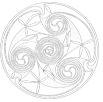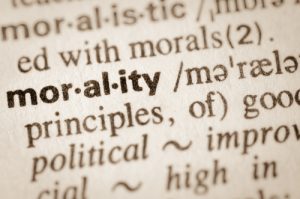A Crisis of Morality
By Paul Dunion | December 19, 2017
There is a crisis of morality that deserves to be identified and understood. Such a crisis can be described as confusion regarding what will sustain our hearts, our minds and our bodies. We simply elected a leader who behaviorally yelled, “I’m going to take the swamp you created, strip it of its sophistication and subtlety, and exhibit it in living color”. Now, we know what veiled values we have been endorsing for some time It will not be helpful to simply scapegoat such a leader, but rather to become more mindful of the values that are more vividly surfacing, and identify what values we want to live by. Change becomes somewhat more likely when unsustainable values become glaringly obvious. Denial becomes more untenable.
We can think of morality as the values we purport or actually enact. Our real values identify how we want to live, what kind of relationships we want, and how we want to work and play. They may also reveal how we want to die, what we want said about ourselves at the time of our death. Most of us do not pause and make a list of our values. We have some life experience that calls for more clarity regarding what we truly value. We face an unwanted pregnancy, feel betrayed by a friend, come down with a catastrophic illness, lose a job or face a political system we no longer believe in.
Clarifying values presents a significant challenge. Discerning whether or not a particular value deserves the credibility we attribute to it is very difficult to achieve. Unlike facts, that can be empirically verified, values are often driven by strong primitive emotions like fear, ambition, revenge and hatred. It is also extremely common for fear to proclaim that a God has endorsed our values. Of course, values that ultimately give rise to evil are normally the result of unaddressed fear. “The spirit of evil is the negation of the life force by fear. Only boldness can deliver us from fear. If the risk is not taken, the meaning of life is violated.” (C.G. Jung) Let’s look more closely at the inherent values of the New Morality that may be in violation of the meaning of life.
Values of the New Morality
- Divisiveness is a priority. A way to bring credence to one’s set of values is to scapegoat and discredit those with opposing values, especially through the use of Ad Hominine arguments. This allows for the avoidance of a constructive exchange of ideas, which may reveal certain shortcomings in one’s thinking. Divisiveness violates the meaning of life as a collaborative venture, one to be co-created. It tends to inhibit the voices contrary to the position of those holding authority. Divisiveness violates unity.
- Prioritizing blame and punishment. Blame and punishment are significant ways to energize divisiveness. They are palpable ways to quiet opposing voices. Punishment violates life, as it does not allow for reconciliation and restorative action to take place.
- Accountability is unnecessary. Accountability means to measure and count what we actually did. Suspending accountability allegedly allows us to avoid the unfavorable reactions others may have in regard to our behavior. Denial replaces accountability. The motto becomes, “There is nothing to account for or measure”. Any accusations are simply deemed false, with accusers being reminded of the price to pay if they move their moral accusations into litigation. When accountability is disregarded, it violates the meaning of life by sabotaging our ability to measure what truly matters. The distinction between compassion and benevolence, vs. ruthlessness and cruelty becomes blurred, clouding their distinctive features. We easily become lost, not knowing what is appropriate behavior, or when we have violated someone.
- Integrity becomes an empty moralistic concept. Living with integrity has no practical significance. It no longer matters if we are acting in accord with our professed values or not. It is okay to say one thing and do another. The meaning of life is violated because it becomes almost impossible to know where to place our trust when integrity is no longer a value.
- Working toward the best version of the truth is unnecessary. Values are established based upon their ability to quell our fears and help us to feel better about ourselves. I often refer to this value as the suspension of ethical engagement, where we no longer face the ambiguity of constructing the best version of values that we can. Jung may be correct in suggesting that it will call for boldness not to allow fear to interrupt our ethical wonderings.
Healing The New Morality
We can ask about the medicine needed in order to bring healing to the new morality. An old definition of the word medicine is “to embellish”. We can imagine what we need to bring more of in order to support healing of an ailing morality.
- Bringing more inclusion. Divisiveness separates, leaving some groups disenfranchised, placing co-creation and building in a very precarious position. We will need to be willing to take more risks, risking getting honest about our fears. Also, needing to risk seeing our own position as needing more consideration and modification.
- Bringing more of an attitude of reconciliation. Blame and punishment do not help us get more clarity about the best version of values we want to live with. Violating those who enacted violation breeds more violation. My colleague, and friend, Dr. Thom Allena, a pioneer in the field of Restorative Justice, focuses on what it means to bring real restoration to both victims and perpetrators of crime, as well as to their friends and families. All concerned parties gather in order to understand how this violation took place, how it impacted everyone involved and how to best address what has been lost. Dr. Allena speaks to his own involvement in the restorative process, “I felt that at some point in my life, I needed restoration and atonement”. Such an attitude may be the medicine needed to mitigate blame and punishment.
- Bring more accountability. Embellishing accountability means not only giving an accurate account of what we did, it is also accounting for the nature of reconciliation. Focusing on such an account may include: Is there some form of reparation I can bring to the injured person or the family? Am I willing to undergo some form of therapeutic intervention? Is there some offering I can make to the community on behalf of the injured party? Embellishing accountability also means working toward diminishing denial. Of late, we see an increasing number of men being asked to leave their positions due to being accused of sexual harassment, and in one case, accusations of child sexual abuse. Two different responses surface. The first is simply to deny in the name of securing more political power. The second is a move toward the high ground, demanding that the individual be removed from office. We can see the second reaction as also an attempt to procure political power by engendering a perception of upholding moral principles. Implementing immediate separation from their work does not foster real accountability and reconciliation. Of course, the organizations that terminate offenders are allegedly demonstrating some occupation of the moral high ground. It may be time to get brutally honest with ourselves, and rather than point fingers, take a genuine moral inventory of our own behavior.
- Bring more honor to integrity. Keep in mind that integrity does not suggest that something virtuous is taking place. Living in integrity means that our actions are compatible with what we actually value and what we say we value. Without integrity, there is no trust, and that is its real importance. We can trust what others say because they consistently do what they say. Their actions continually attest to a particular set of values. It does not mean that some incident of being out of integrity should result in that person never being trusted again. None of us will always be acting in integrity. Accountability and reconciliation are important here. We can give an account of a choice we made that did not reflect what we value. We can reconcile with anyone whom may have been hurt by our decision. We also need to get right with ourselves. We can ask: What will bring an inner reconciliation? Is there some lesson asking for my attention? How did I come to step away from what I value and cherish? What will help me act more congruently with my values in the future?
- Bring more ethical engagement to our lives. We create an ethic by working toward creating the best version of the truth we can arrive at, accompanied by compassionate imagination. The importance of the role of imagination in the building of an ethic is captured in the work of John Paul Lederach. “Transcending violence is forged by the capacity to generate, mobilize, and build the moral imagination.” We remain ethically engaged when we commit to being mindful of the role of fear in regard to our moral conclusions. As Jung suggested, it will take boldness to get honest about our fears. We will need also to boldly learn to support ourselves when the tempest of doubt shakes the ground beneath us, avoiding what James Hollis refers to as “attaching to a contrived certainty”. Ethical engagement is energized by curiosity, imagination, wonder and patience. Coming clear with ourselves, and with others about important moral positions calls for endurance and resiliency. Unpacking the myriad of ways we defend against experiencing the tension of fear takes time. Here are some questions that can help to focus a commitment to remain ethically engaged: What do I truly cherish? How do I speak and act in support of what I cherish? Howe do I feel and act in the presence of someone voicing the opposite value? How can best support myself when feeling threatened by a diverse view? Howe can move beyond needing to make someone bad in order to confirm my own goodness? How can I build some form of coalition with those holding different values from mine? How can I effectively build enough internal resource allowing me to offer mercy and reconciliation? What external support will help me to live a best version of the truth that only in unity will the meaning of life not be violated?
Lack of accountability, minimizing the value of integrity, promoting divisiveness, prioritizing blame and punishment and believing whatever has us feeling better about ourselves reflect a deep loss of faith in life. Erich Fromm reminded us of such a loss. “But it doesn’t make much difference whether it is faith in a person or God, which is shattered. It is always the faith in life, in the possibility of trusting it, of having confidence in it, which is broken.” We lose faith in life and violate its meaning when convinced that we will be hurt and forgotten. We either run from life collapsing in apathy or depression, or fight with life. We find no reason to hold our lived experience with reverence for others, and for ourselves and the planet we call home. A crisis of morality is inevitably accompanied by a crisis of a faith.
This crisis of faith is unfortunate and yet, possesses opportunity. It is an important time to pause, finding enough humility to acknowledge we don’t know what to believe in? It is a time to come together with our shared doubt. It is a time to interrupt scapegoating someone or some group, getting honest about our need for help. Hopefully, we can find the courage to ask for help, and holding the faith that help is forthcoming, may be as good as it gets for now.

